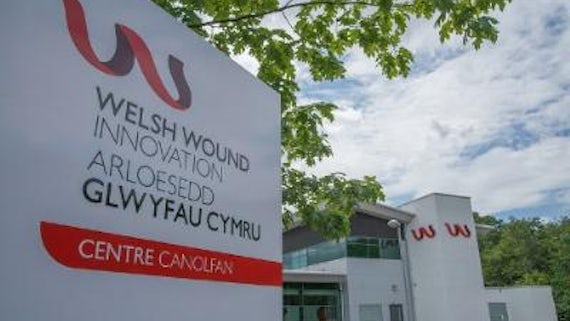Centre launches to improve wound treatment
10 Medi 2014

A new centre devoted to tackling the "silent epidemic" of wound care will launch today.
Wound care currently costs the NHS across the UK at least £4billion annually, accounting for around 5% of the NHS's overall budget and rising.
The Welsh Wound Innovation Centre (WWIC) has been established to reduce this cost, improve patient care and create jobs by combining the expertise of the NHS, private sector and higher education with a backing worth £2.5M from the Welsh Government.
"Treating patients with wounds, whether chronic, acute or traumatic is a surprisingly expensive problem for the health service - not to mention the emotional costs it inflicts on patients and their families," said the Centre's new director, Professor Keith Harding, head of the University's Wound Healing Research Unit. "Having up until now received little attention from policy makers or research funders it has become a silent epidemic.
"Our new Centre will employ new methods to improve how wounds are prevented and treated, to enhance the quality of life of patients through better diagnosis and treatment. This will result in fewer hospital admissions and shorter hospital stays, reducing overall health costs for the NHS in Wales by preventing use of inappropriate interventions."
The Centre will be based adjacent to the Royal Glamorgan Hospital where patient based research will be undertaken to tackle challenges associated with wounds and their associated problems. It will provide education and training services to the NHS, academic institutions and commercial customers. The Centre is already impacting the economic development of Wales by directly supporting the work of five Wales-based SMEs and attracting inward investment into Wales, including American and Australian companies.
Professor Harding added: "We have already signed a memorandum of understanding with a wound initiative company in Australia, funded by their federal government, which will encourage collaborative research opportunities and student exchange. The centre is a real opportunity for Wales to become recognised as a world-leading nation in wound healing. It will employ 31 people at the outset and over the next five years we aim to attract at least 11 inward investments creating a further 45 jobs."
As well as job creation, the revenue gained from inward investment will help fund clinical trials and finance a range of commercial activities such as the development of new products and technologies designed to improve wound care. The Centre recently won its first major research award from the Medical Research Council (MRC) which will help scientists develop a diagnostic test to improve the treatment of chronic wound management.

Opening the centre will be Mark Drakeford AM, Minister for Health and Social Services. He said:
"I am delighted to be opening this exciting new research centre, which will be a Welsh centre of excellence in wound prevention and treatment. Its focus will be on developing better treatments for patients which will improve their quality of life. It will also attract investment and help create jobs in the medical technology sector.
"Our population is getting older and the time and cost associated with treating and managing wounds is set to increase. Only by looking at new ways of treating wounds can we manage this trend and improve people's quality of life. This centre builds on a foundation of expertise in Wales, which has an international reputation for wound healing.
"Helping our healthcare system to work more effectively with universities and industry will contribute to economic growth, as well as improving our health services and the care people receive in Wales."
The Welsh Wound Innovation Centre (WWIC) is part of a broader initiative: The Welsh Wound Innovation Initiative, which was established to provide innovative solutions to wound care issues. The broader initiative includes the Welsh Wound Innovation Science Park which focuses on job and wealth creation in Wales.
A National Wound Registry will be established to capture information from patients and clinics about wounds, their occurrence, treatment and trends to provide experts with a stronger intelligence base to draw from.
The Centre will build on the work of The Welsh Healing Research Unit (WHRU), which was created in 1991. Led by Professor Harding, it was the world's first research unit to specialise in wound healing. The Unit's work was recognised by the awarding of a CBE to Professor Harding in 2013.